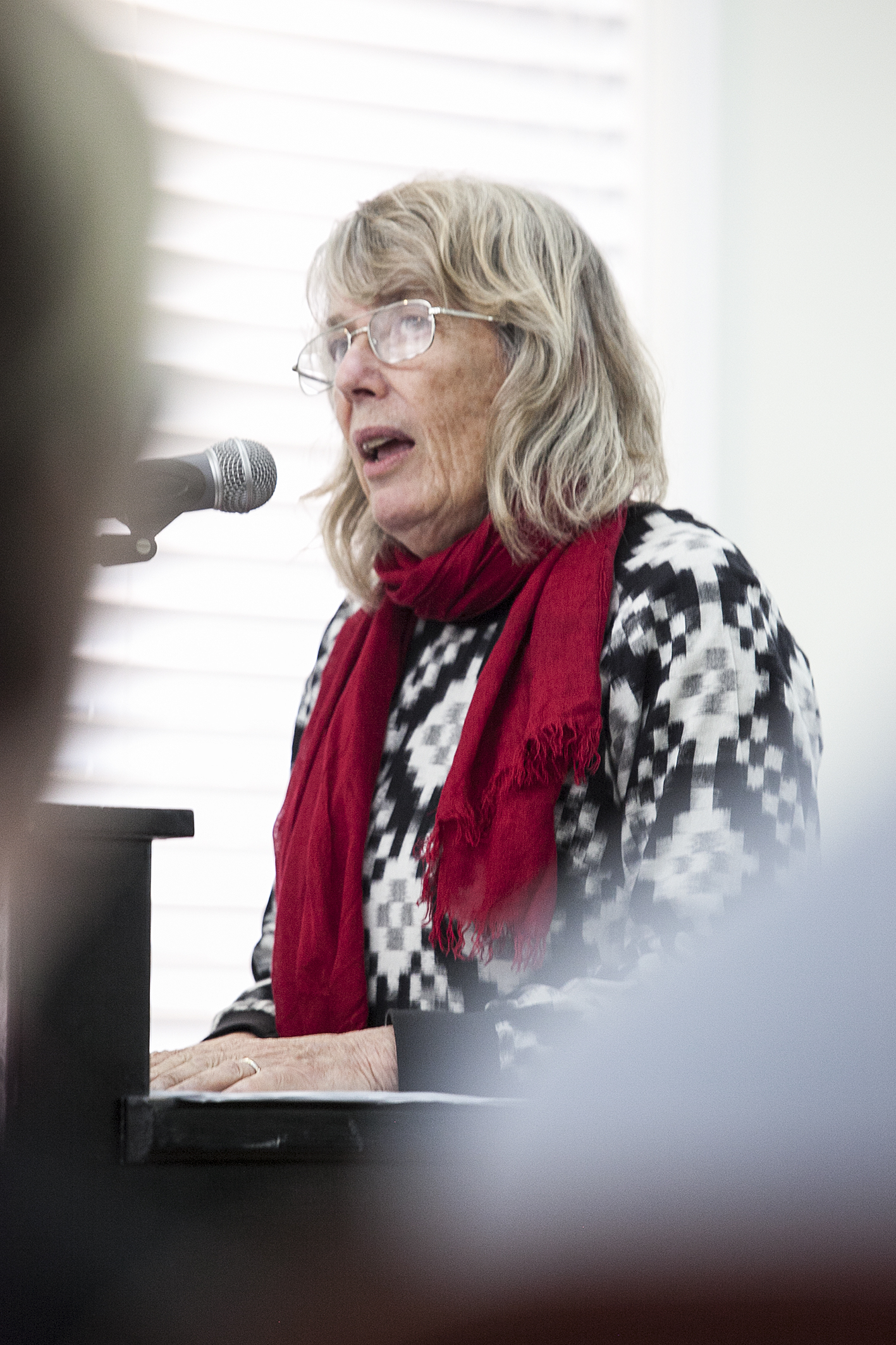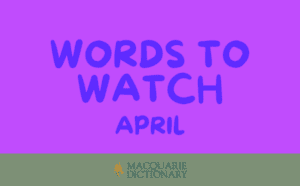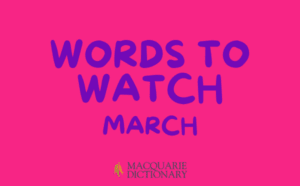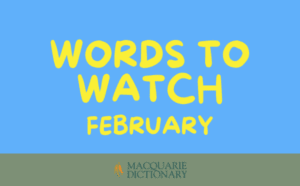In my years as a dictionary editor I have found that one thing that stirs the imagination of an audience and puts a certain light in their eyes is the notion that they might make up a word that gets into the dictionary. I think that what stirs them is the desire to make their mark and leave it for posterity. To invent some piece of nonsense is one thing, but to persuade the dictionary to accept it – that is another. I think that has to do with the power and authority of the dictionary. A word isn’t quite a word until it is slotted into its particular place between A and Z.
There are reasons why people attempt to invent words – some genuine, some commercial, some attention-seeking.
An example of a genuine invention, needed because there was no existing word, is petrichor.
The explanation for it in the dictionary is as follows:
The term petrichor was coined in Australia in 1964 by two CSIRO scientists to describe the smell that occurs when it rains or is just about to rain. It was discovered by examining stones and clays that exhibited a distinct smell when moistened or breathed upon. Within, a yellowish oil was discovered as the source of the smell and subsequently named `petrichor’ or `blood of the stone’. The oil is exuded by certain plants during dry periods, and it is then absorbed by clay-based soils and rocks.
When the rocks and stones that harbour this oil are exposed to water – usually rain – a reaction occurs that releases the petrichor into the air. When rain hits a surface, it traps gases which are released as aerosols, taking with them a component of whatever they have hit. In these cases, a small portion of petrichor is released with the gases and distributed via wind through the air.
These scientists knew their Greek it seems and were able to put petros (rock) and ichor (hidden fluid) together.
I have cautioned people on how difficult it is to create a new word and have it accepted by the community – because it is that acceptance that is the passport to dictionary inclusion. You can see the gleam in their eye as they consider ways of tricking me into thinking that their word has currency. They might get all their friends to use it and create a flood of internet citations. That of course is perfectly possible but usually detectable as essentially one occurrence replicated a number of times.
Most people consider briefly this possibility of gaming the dictionary and gaining permanence in a transient world, and then give up almost immediately and move on to other more sensible things.
But some have shown a flair for word coinage and have had their names recorded in the etymologies of the dictionary a number of times.
There is of course Shakespeare.
So often it is claimed that Shakespeare invented a number of words – the number varying from 2,500 to the more airy ‘thousands’.
Words that are said to be Shakespeare Inventions
To test the truth of these claims, I examined some words selected from the list of English words invented by Shakespeare which appears in Wikipedia.
Hobnob is one that caught my eye.
It turns up in Twelfth Night:
a1616 Shakespeare Twelfth Night (1623) iii. iv. 234 His incensement… is so implacable, that satisfaction can be none, but by pangs of death and sepulcher: Hob, nob, is his word: giu’t or take’t.
In this instance it is a variation on the phrase hab nab which first appears in the 1540s and seems to be related to the notion of to have and have not.
Variations like this are not uncommon. Something that is hep becomes something that is hip. We have a hipster but we could have had a hepster, and we still have a hepcat.
Eventually the phrase is associated with drinking as the Oxford English Dictionary explains:
hob or nob n. (or hob a nob, hob and nob) (probably = give or take, give and take) used by two persons drinking to each other. to drink hb or nob, hob a nob, to drink to each other alternately, to take wine with each other with clinking of glasses.
And thus by an easy step it comes to mean not just drinking with someone but associating with them generally – our current meaning of hobnob. But not Shakespeare’s.
Suffice it to say that I found many entries for which Oxford English Dictionary gave earlier citations, and many that fell into the category of predictable derived forms and fashionable word play.
Shakespeare did do a lot of shoving of nouns and adjectives into verbs, a form of word play that again eased the task of scanning correctly and gave a life and vigour to his writing.
For example Mowbray complaining about his sentence of banishment in Richard II:
Within my mouth you have enjailed my tongue,
Doubly portcullised with my teeth and lips … (1.3.160)
But this possibility always exists in English. Indeed we tend to see as a virtue in Shakespeare something which we decry in American English today. How many complaints has the dictionary received about the use of agenda as a verb! It is true that portcullis as a past participle of a verb is quite a stretch and quite ear-catching but that is the work of a dramatist – to catch the ear.
So you can see that you need to take these assertions of great inventive powers with a grain of salt.
I don’t wish to appear to be a killjoy so I will say now that while I am very sceptical about the claims for completely new coinages, claims are now made for a range of authors because one listicle generates another. I personally am not at all troubled by this, because what I can see quite clearly is that there are certain writers who have a very good ear and who are immersed in the language of their day but somehow consciously attentive to it at the same time, so that when the need arises for a colourful turn of phrase or a bit of authentic dialogue, they can pull the right words out of their personal language archive.
While I can to some extent debunk the Shakespeare myth of contributing vast numbers of words to the English language, I can still happily agree that he was a great writer who used the resources of the English language to bend words to fit the metre and to create ear-catching compounds, that he was a writer who had a very good ear for the spoken language of his day.
With that sobering thought in mind, we can see what Dickens might claim as his contribution to the English language.
Dickens created memorable characters which led in turn to references to these characters being cemented into English. A good example is:
Micawberism which Macquarie defines as the attitude of a person who makes no provision for the future, trusting wholly in good fortune. This is a reference to Mr Micawber in David Copperfield (1850 as a novel) who was fond of saying ‘something will turn up’.
Other dictionary entries are perhaps now somewhat dated or purely British English.
- Pecksniffian making a hypocritical parade of benevolence or high principle. After Mr Pecksniff in Martin Chuzzlewit (1843).
- Pickwickian The definition reads: (of the use or interpretation of an expression) unusual, or intended to be understood in an unusual sense; recondite. From Samuel Pickwick, the benevolent, naïve founder of the Pickwick Club in the Pickwick Papers.
- bumbledom a petty officiousness in a minor office. After Mr Bumble in Oliver Twist (serialised from 1837 to 1839.
- Dolly Varden a brightly flowered print gown or hat. Named after a character in Barnaby Rudge (1839).
- gamp an umbrella. From the umbrella carried by Mrs Sarah Gamp in Martin Chuzzlewit.
These are references to Dickens rather than his coinages.
So I did a search on Dickens in Green’s Dictionary of Slang for colloquialisms for which Dickens is cited. In every case apart from spoffish these are not first citations.
I found that it demonstrated that, as with the other writers I have mentioned, Dickens had a very good ear for the slang of his day. He used older slang quite naturally and the newer items he put in quotes to show that they were not quite settled in the language yet, just as we would today.
So go off meaning ‘to get married’ is used in the assumption that it will be understood, as is do the amiable and blow somone up (to scold someone) and stump up. But cut it fat meaning ‘to behave in a vulgar way’ and chill meaning to warm up (short for take the chill off), and kiddy for a stage-coach driver, are all in quotes to indicate that they are freshly minted.
Which is why I find it hard to believe that spoffish is Dickens’ own invention. He uses it with such naturalness, there are no quotes to indicate that it is new. I think that it is a colloquialism that is familiar to Dickens and that he quite likes, but which otherwise did not make it into print and passed out of fashion quite quickly. Like awesomesauce today.
spoffish
1834 Dickens ‘Horatio Sparkins’ in Slater Dickens’ Journalism I (1994) 351: A little spoffish man with green spectacles.
1835 Dickens ‘Steam Excursion’ in Godey’s Mag. 10 86/1: He invariably spoke with astonishing rapidity; was smart, spoffish, and eight-and-twenty.
Note the Oxford English Dictionary comment on the use of the –ish suffix:
In recent colloquial and journalistic use, -ish has become the favourite ending for forming adjs. for the nonce (esp. of a slighting or depreciatory nature) on proper names of persons, places, or things, and even on phrases, e.g. Disraelitish, Heine-ish, Mark Twainish, Micawberish, Miss Martineauish, Queen Annish, Spectator-ish, Tupperish, West Endish; all-over-ish, at-homeish, devil-may-care-ish, how-d’ye-doish, jolly-good-fellowish, merry-go-roundish, out-of-townish, and the like.
You must bear in the mind that this entry was first published in 1901 so ‘recent’ refers to the late 1800s.
Note the Dickens invention of clean cravatish.
1836 Dickens Sketches by Boz 1st Ser. II. 2 A clean cravatish formality of manner.
And in Pickwick Papers he came up with touch-me-not-ishness. He was clearly into the fashionable word play of his day. If only we knew where spoff came from we would understand how he arrived at spoffish.
I wanted to point out that you don’t necessarily have to be an exceptional writer to have this finely attuned ear. In the early days of the dictionary we established a corpus of Australian writing to underpin the dictionary entries and provide examples of use. Initially we asked experts to draw up a list of fiction and non-fiction that ought to be in this database. That accomplished we felt satisfied with our corpus – but then we found that there were Australian writers that we hadn’t included who had this facility and who ought to be in. One such writer was Norman Lindsay in whose novels we found a great deal of citational evidence for the slang of the 1930s to the 1950s.
I would like to say again that I think that Dickens had a remarkable ear for spoken language and a remarkable memory which allowed him to pour out onto the page everything that he had picked up in his life, certainly with sufficient authenticity to fulfil his purposes which were not linguistic but literary.
I think that this desire to claim, for him and Shakespeare and others that they made up a whole host of words is misguided. It ignores the fact that that is not usually how writers work. Poets have a particular need to crimp and adorn their words to make the music work, but that is why the dictionary on the whole steers clear of poets. Their use of language is too idiomatic.
I think we should spare Dickens the indignity of becoming fodder for an internet listicle. His contribution and significance is so much greater than that!





